Postiva Now Available in California
Syngenta announced last week that its newest fungicide, Postiva, is now registered for use in California. Postiva contains pydiflumetofen and difenoconazole (FRAC 7 + 3) and is a broad-spectrum fungicide with strong efficacy against powdery mildew, leaf spots, Botrytis and more.
Postiva can be applied by drench, spray (including aerial application), chemigation and cold fogging at the use rate of 10 to 28 fl. oz. per 100 gallons (use rates vary by crop). You can use this fungicide on ornamentals, vegetables, and non-bearing fruit and nut trees grown in nurseries, greenhouses and landscapes.
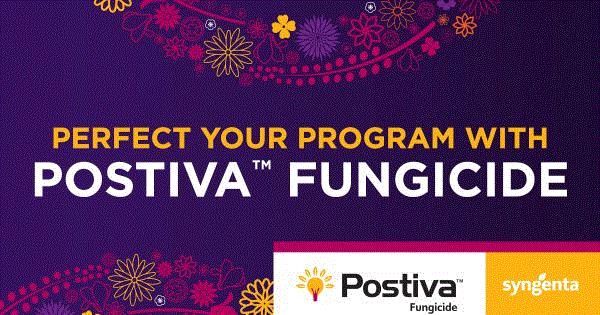
The restricted entry interval (REI) is 12 hours. The personal protective equipment (PPE) are coveralls, chemical-resistant gloves and shoes plus socks.
GO HERE to find more information about Postiva, including label, safety data sheet (SDS), information sheets for different crops, fungicide programs that incorporated Postiva and trial data.
New Research Effort Against New Phytophthora Species
Not sure if y’all heard: Phytophthora austrocedri was detected in two Oregon nurseries in late August. This is a new Phytophthora species that was only recently discovered and described in Patagonia, Argentina, in 2007, causing the death of Cordillerian cypress trees in the South American country. In 2011, infections were detected on several cypress and juniper species in the United Kingdom. It’s also known from Iran and Germany before this new detection in Oregon. It’s unclear how the pathogen got here.
Folks are understandably on high alert since the detection because this pathogen appears quite deadly to some members of the Cupressaceae family. AmericanHort has worked behind the scenes to secure resources for tackling this new pathogen.
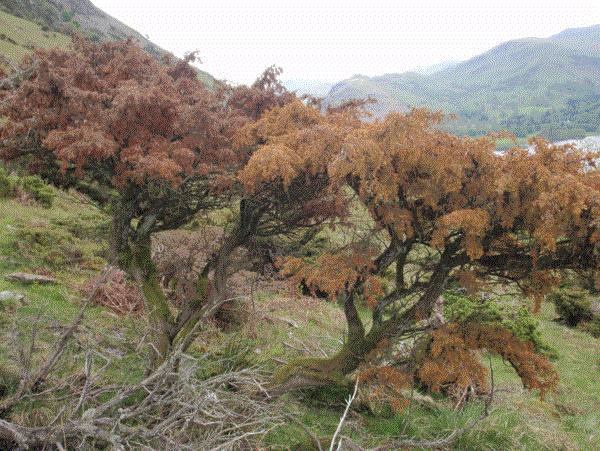
Dying junipers in the United Kingdom. (Photo credit: Crown Copyright, Forestry Reseach, United Kingdom.)
The Horticultural Research Institute announced last week that it has secured $250,000 from USDA-ARS’s Floriculture & Nursery Research Initiative (FRNI) to study and manage this emerging new pathogen. The funding will allow researchers from USDA-ARS and Oregon State University to explore the biology, epidemiology and management of this new Phytophthora species. In addition to understanding how the environment of the Pacific Northwest may contribute to the epidemiology of the pathogen and identifying effective fungicides, the project will also identify cultivars or species that may be resistant to the disease.

Will You Pay More for Alternative Flatheaded Borer Control?
Why people pay thousands for a Louis Vuitton bag (or any other luxury goods for that matter) is beyond me. While consumer preference and willingness to pay is a mystery to me, the ability of manufacturers or retailers to generate this preference or willingness is simply fascinating.
I suppose the pricing of any goods is a matter of knowing how much something is worth in the consumers’ minds and what factors may generate the highest possible price. We do that too in our industry. Lots of consideration goes into pricing a pot of azalea or any of our products.
Alicia Rihn, Kim Jensen and Samuel Gerloff of the University of Tennessee, Karla Addesso of Tennessee State University, and Ben Campbell of the University of Georgia demonstrated some of the process of pricing blueberry bushes and red maple trees in the context of flatheaded borer management. Alicia summarized some of their works in a recent eGRO Alert. (Go HERE to see the article.)
So let’s start with the backstory: Flatheaded borers tunnel into tree trunks and the most effective way of managing the infestation is to drench with a systemic insecticide, particularly the neonicotinoids. We all know neonicotinoids carry baggage, so a research team funded by the USDA’s Specialty Crop Initiative Grant (which I was a part of) has been trying to find alternative management approaches, such as non-neonic or pollinator-friendly insecticides, resistant cultivars, and cover crops. Alicia and her colleagues are tasked with determining if these alternative management approaches will increase or decrease the selling price of a blueberry bush or a maple tree.
The team identified several alternative solutions and conducted an online survey of 519 individuals who make gardening decisions for the household in 2022. Interestingly, 60% of these survey participants reported seeing flatheaded borer damage in the past when shown a picture of the damage. (I didn’t think folks can recognize the damage so easily.) Participants were asked to evaluate plants with different attributes and indicate which one they would purchase.
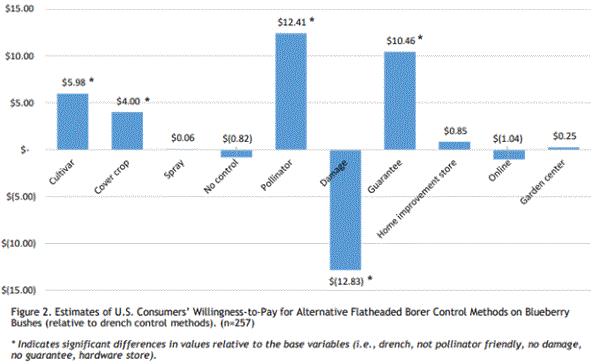
Unsurprisingly, consumers preferred blueberry plants and maple trees with no flatheaded borer damage and discounted damaged bushes or trees tremendously (by more than $10). Also unsurprisingly, consumers placed a premium on plants that were produced with pollinator conservation in mind and if the plants have a six-month guarantee of being protected from flatheaded borers. Other attributes generated different premiums and discounts, and the results are different between blueberry and maple.
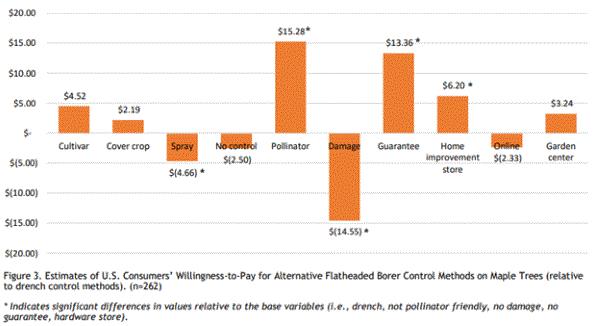
Alicia and the team concluded that consumer preference can vary among plant species, even if they’re damaged by the same pest. For fruit-producing plants, consumers seem to have an aversion to drenches of systemic insecticides (understandably). Promoting alternative management approaches (such as cultivar selection) at the retail outlet may encourage sales. For maple trees, control methods have less impact on sales.
Lots of interesting insights can be found in Alicia’s eGRO Alert. Go HERE for a copy.

Vascular Streak Dieback Webinar
I passed on an invitation to participate in a survey on vascular streak dieback (VSD) in the last issue. The goal of the VSD survey is to solicit what you think are the most important research and extension activities against this disease. The information you provide will help narrow the focus for a future multi-million-dollar research project.
Here's another piece of VSD-related news for y’all today:
Members of the North Carolina Nursery & Landscape Association are in luck. You’ve been invited to an exclusive webinar on VSD, coordinated by Stacey Jones of North Carolina State Cooperative Extension Service. The webinar will feature informative presentations and discussions about diagnosis, epidemiology and management of VSD from Mike Munster (North Carolina State University), Fulya Baysal-Gurel and Prabha Liyanapathiranage (Tennessee State University), HT Tseng (North Carolina Department of Agriculture & Consumer Services), and Devin Bily (Virginia Tech).
The webinar is scheduled for this Thursday, September 26 from 10:00 a.m. to 12:00 p.m. Eastern. Go HERE to register.
Do you have some kind of conflict that’ll prevent you from attending the webinar? No fear! You can still register for the webinar and receive a link to the recording. You won’t be able to access the recording if you don’t register, so go HERE to register!

New Training Courses and a Survey
Y’all know about the Greenhouse Training Online Program, offered by the University of Florida, right? You might have heard from me or one of my esteemed colleagues or had participated in the professional training program in the past.
Two new courses from this award-winning training program will be offered in October:"Success with Your Latino Workforce” and “Weed Management.” Go HERE to register for either one or both courses.

“Success with Your Latino Workforce” is a brand-new course for this year! Claudio Pasian of The Ohio State University will help non-Latino supervisors prepare to supervise and work with Latino employes. You’ll learn common Spanish terms and phrases for communication, understand a mixed culture workforce, and prepare you to solve workplace issues.
“Weed Management” will be taught by Chris Marble, weed-man extraordinaire from the University of Florida. You’ll learn to identify common weed species and how to manage them. This course qualifies for a Plant Health Professional Certificate and is offered in English and Spanish.
On another note, the Greenhouse Training Online Program is asking for your help in identifying topics you’d like the training program to offer. Whether you’re the owner, head grower or work in the watering or sales team, you’re invited to participate in the survey. This anonymous survey takes only 15 minutes to complete. Go HERE or scan the QR code above to participate in the survey. Go HERE to contact the folks at the training program if you have any questions.
Thanks for your participation!

Participate in the Salary & Benefits Survey
It’s that time of the year again! Once again, we at GrowerTalks are calling for your help in completing the Salary & Benefits Survey. This is the 29th year GrowerTalks and the 16th year Green Profit have conducted the survey. For the second time, GrowerTalks and Green Profit are partnering with AmericaHort and Industry Insights in conducting the survey. Go HERE to participate in the survey.
So why in the world do you want to take about 25 minutes from your busy schedule to complete this survey? Well, the survey will allow the owners and growers of retail and wholesale operations to see where they are in terms of the salary and benefits that they offer to their employees. Are you right on par or do you pay too little to attract the best talent? Did you add staff in 2024, despite a slightly less-optimistic outlook reported in the 2023 survey (see the graph below)? What are employees looking for in an employer?
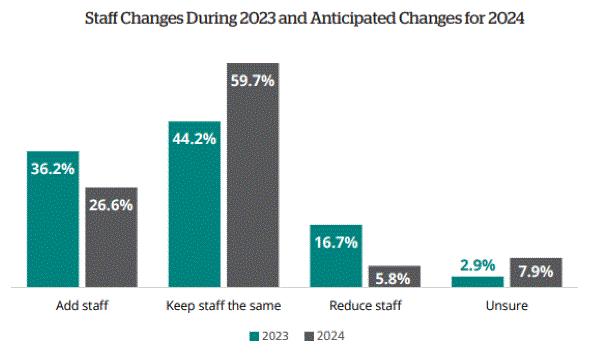
Not to mention you'll have a chance to win a Yeti Tundra 45 Hard Cooler after completing the survey.
Results of the survey will be shared in a report (go HERE for an example of the 2023 survey report). For AmericanHort members, you'll also get (for free or at a price, depending on your membership status) a Company Compensation Comparison Report, which will let you see where you stand compared to your peers and competitors.
The nice folks at GrowerTalks and Green Profit will also provide summaries of the results in December and January. Go HERE for the previous year's summary from GrowerTalks (greenhouses and nurseries) and go HERE for last year's summary from Green Profit (retail garden centers).



See y'all later!

JC Chong
Technical Development Manager at SePRO
Adjunct Professor at Clemson University
This e-mail received by 27,847 subscribers like you!
If you're interested in advertising on PestTalks contact Kim Brown ASAP!